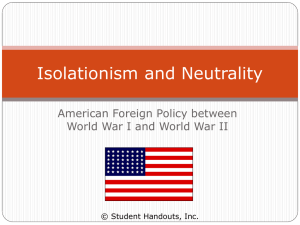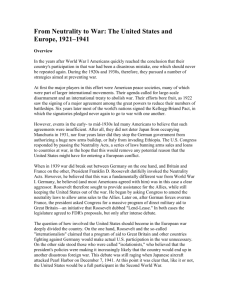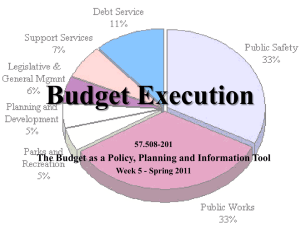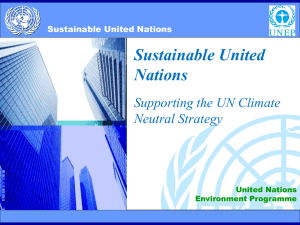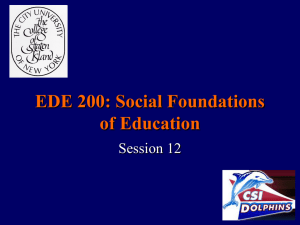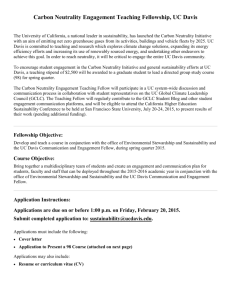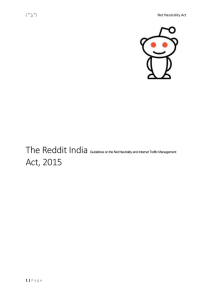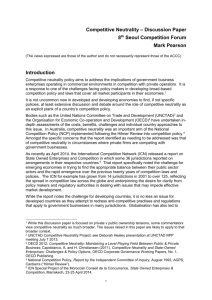A Climate Action Plan for the Monterey Institute of International Studies
advertisement
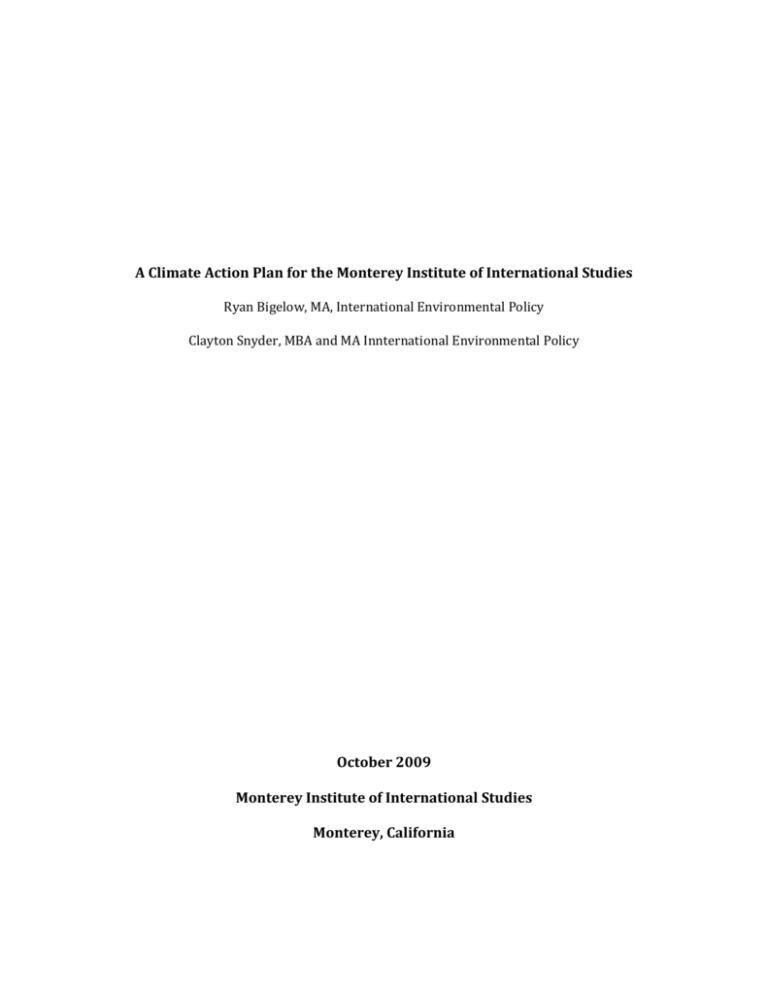
A Climate Action Plan for the Monterey Institute of International Studies Ryan Bigelow, MA, International Environmental Policy Clayton Snyder, MBA and MA Innternational Environmental Policy October 2009 Monterey Institute of International Studies Monterey, California Introduction According to the October 2006 Economics of Climate Change report published by the Stern Review, the costs of climate change will be equivalent to at least 5% of global GDP each year, beginning in 2006 and lasting into perpetuity under a business-as-usual scenario. Meanwhile the 4th Report of the International Panel on Climate Change (IPCC) corroborates this conclusion, stating that "Unmitigated climate change would, in the long term, be likely to exceed the capacity of natural, managed and human systems to adapt." It is the responsibility of every organization, and every individual for that matter, to face this challenge by modifying the activities that contribute to the problem. This document identifies a strategy that will fulfill the Monterey Institute's signed commitment to achieve "carbon neutrality," or to "eliminate its contribution to global warming over time," within the framework of the American College and University Presidents' Climate Commitment (ACUPCC). The ACUPCC is a binding agreement for the Institute to submit, openly publicize, and follow a plan and timeline for carbon neutrality. The Institute's carbon neutrality initiative offers numerous financial and nonfinancial benefits. In economic terms, becoming carbon neutral reduces operating costs over the medium term by reducing the energy consumption that is a source of CO2 emissions. Being carbon neutral also has the potential to generate revenue for the Institute over the near term by demonstrating its commitment to an issue in a competitive market for increasingly socially conscious prospective graduate students. Furthermore, Middlebury College, the institute's partner institution, enacted a set of policies in 2007 that will enable it to achieve carbon neutrality by 2016. It is recommended that MIIS match Middlebury's commitment to leadership in this area. By following the strategy outlined herein, the Institute will accomplish the carbon neutrality goal no later than January 1, 2016. While a more detailed and formal Carbon Neutrality Plan is in the final stages of the approval process, the strategy outlined here is an accurate representation of the steps MIIS will take to achieve carbon neutrality by the stated deadline. Strategy MIIS will employ a combination of energy efficiency, materials conservation efforts, incentives to limit air travel, and carbon offsets to reach the neutrality goal. The specific energy efficiency measures employed are as follows: timers and motion sensors on campus lights; lighting system equipment retrofits; and application of networked computer power saving software. A policy that will incorporate the cost of air travel emissions offsets into employee travel budgets is also currently under review. Other measures intended to minimize the consumption of materials related to campus printing are concurrently underway. The carbon neutrality plan will hinge on maximizing conservation in these two areas while investing the associated cost savings in a revolving fund. The Institute has determined that the savings from these programs are sufficient to purchase offsets for the remainder of its emissions from air travel and other sources. January 1, 2016 has been identified as an absolute latest deadline for this offset purchase, although it is possible that it will occur sooner, based on the success of the measures mentioned above. Educational Experience The pursuit of carbon neutrality and the broader goal of sustainability provide a plethora of opportunities for students to enhance their educational experience at the Monterey Institute. For example, all greenhouse gas audits, the carbon neutrality plan, and initiatives related to tangible action points have been developed and implemented by students. In the future, as the Institute begins to purchase carbon credits as part of our carbon neutrality initiative, students will have the opportunity to compare various carbon offset providers across a spectrum of criteria to determine the program most suitable to the Institute's specific emissions profile, needs, and interests. Students have consitently applied curriculum materials and concepts such as calculating the financial, environmental, social costs as well as the policy implications, in finding solutions to campus sustainability problems. Research Faculty within the International Environmental Policy (IEP) Program have contributed significantly to the literature and research on climate change, and continue to publish regularly on the topic. Mitigating climate change, adapting in the face of increasing environmental pressures, and the economic underpinnings of climate change policy are all areas in which IEP faculty and students are deeply involved. Specifically, Dr.'s Scorse, Williams, and Langholz have all published in this field. Dr. Williams is teaching a seminar on Greening the Grid: The Present, Past, and Future of Electric Power Systems in the Fall of 2009. Community Outreach The Monterey Institute of International Studies is a proud member of the local community. Every year, the Institute hosts community Earth Day events designed to spread the message about climate change and sea level rise, which is a particularly critical issue for our coastal community. Furthermore, the Institute is frequently the host of educational events such as speakers, panel discussions, and conferences, devoted to this topic. The Institute has also begun hosting a weekly Environmental Speaker Series, which is offered for free to students and the general public, providing a communal space for people to learn about environmental issues and speak directly to experts in the field. Tangible Action Points The Monterey Institute has successfully implemented the following Tangible Action Points: 1) Initiative A: Green Building Policy. The institute’s Green Building Policy successfully fulfills the requirements set out by ACUPCC and requires all new construction to be designed, built and commissioned to a minimum of LEED-NC v3 “Silver” rating or equivalent. 2) Initiative G: Waste Minimization. The Institute is an active participant in the RecycleMania Waste Minimization competition, and has adopted Measures #3,#9 and #12 from the 17 possible options. The Institute is also currently considering the implementation of measure #10. 3) Initiative B: Energy Star Procurement Policy. The Monterey Institute of International Studies commits to: 1) Purchase only Energy Star Certified Products in all areas where such a rating exists and whenever financially feasible. 2) Purchase computers (desktops, laptops and monitors) according to criteria established by the Electronic Product Environmental Assessment Tool (EPEAT). Conclusion Through a combination of energy efficiency, materials conservation efforts, and carbon offset purchasing, the Monterey Institute will reach carbon neutrality by no later than January 1, 2016. While cognizant of the hurdles that remain in this process, the invaluable benefits to the environment, the local community, and to the Institute itself, make it a goal that must be accomplished.

